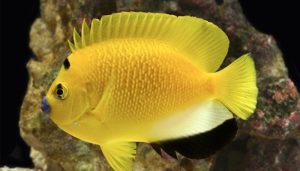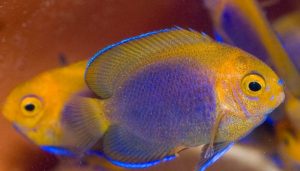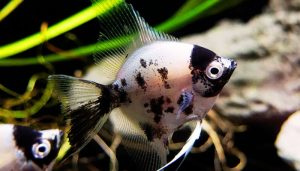Why does My Betta Fish Won’t Eat and Barely Moves? Is your betta fish refusing to eat and barely moving? This can be alarming for any fish owner. Could it be stress, illness, or poor water conditions causing this behavior?
A betta fish may stop eating and become lethargic due to issues like temperature shock, infections, or even boredom.
Common causes include poor water quality, overfeeding, or internal parasites. Identifying the exact problem and making necessary adjustments can help restore your fish’s health.
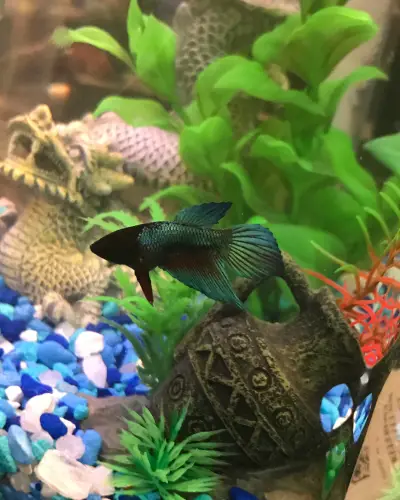
But what are the best ways to diagnose and fix these issues? Experts like Dr. Richard F. Stratton emphasize the importance of maintaining optimal tank conditions.
Let’s explore the causes and solutions in detail so you can get your betta back to its active self!
Table of Contents
ToggleWhy is My Betta Fish Won’t Eat and Barely Moves?
When a betta fish isn’t eating and seems to barely move, it often indicates that something is amiss in its environment or health. Bettas are tropical fish and thrive in specific conditions, which means any deviation can lead to lethargy and loss of appetite.
Factors such as water quality, temperature fluctuations, and the presence of toxins like ammonia or nitrite can greatly affect a betta’s well-being.
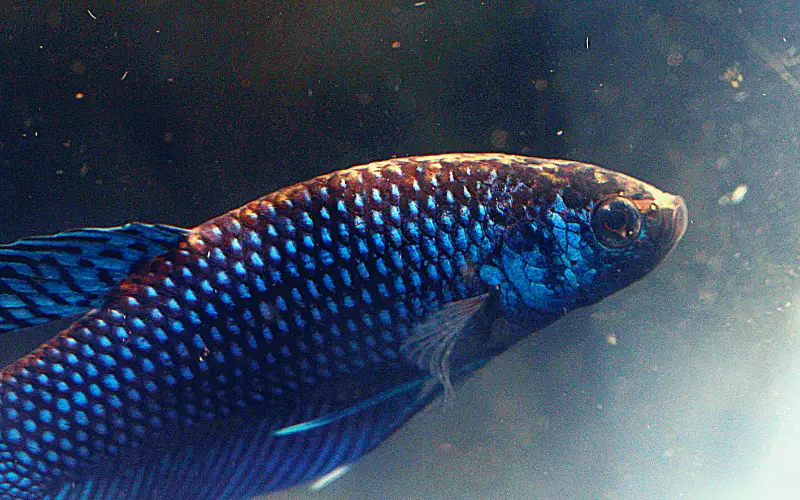
If you notice your fish lying at the bottom of the tank or near the surface, it’s crucial to check the tank’s water parameters. A sudden change, such as a new tank or inadequate cycling, can also stress the fish, leading to these concerning symptoms.
Moreover, if the betta is not eating for an extended period, typically around 5 days, it could indicate more serious health issues, such as fin rot or dropsy.
Male betta fish, in particular, can exhibit signs of stress when housed in less-than-ideal conditions or when they are not properly acclimated to their habitat.
In these situations, it’s essential to observe not just their eating habits but also their general behavior to identify any signs of illness that may require immediate attention.
Causes of Betta Fish Not Eating
One primary cause for a betta fish not eating is poor water quality. Bettas are sensitive to the water parameters in their aquarium, including ammonia, nitrite, and nitrate levels. If these levels are too high, it can lead to stress and a decreased appetite.
Additionally, if a new tank has not been properly cycled, the fish may be exposed to harmful toxins. Another cause could be the temperature of the water; tropical fish like bettas require their environment to be maintained at a stable temperature, typically between 76°F and 82°F. If the water is too cold, your betta may become lethargic and uninterested in eating.
Another potential reason betta fish may stop eating is illness or stress. Conditions such as fin rot can make them feel unwell and lead to a lack of interest in food. Another possibility is that the fish may be overly stressed from aggressive tank mates or an unsuitable habitat, which can deter them from eating.
Furthermore, if a betta fish has been recently introduced to a new environment, the stress of acclimatization can also contribute to a temporary loss of appetite. In any case, assessing these factors is crucial for the health of your betta.
What to Do If Your Betta Fish Is Not Eating
If you find your betta isn’t eating, the first step is to check the water quality. Test your water for ammonia, nitrite, and nitrate levels to ensure they are within safe parameters. If you discover elevated levels, perform a water change to improve the overall water quality in the tank.
Additionally, ensure the heater is functioning correctly to maintain a stable temperature. After addressing these issues, try offering a variety of food options, such as high-quality pellets or even live shrimp, to entice your betta to eat. Sometimes, a change in diet can spark interest.
If the betta fish continues to refuse food for more than a few days, consider isolating it in a hospital tank to monitor its condition more closely. This will minimize stress from other tank mates and allow you to observe its behavior without interference.
If signs of illness such as fin rot or dropsy appear, consult resources like a betta fish forum for advice from experienced betta owners. They can provide valuable insights into treatment options or adjustments that may revive your fish’s appetite.
How to Prevent Decreased Appetite in Betta Fish
Preventing a decreased appetite in your betta fish begins with maintaining excellent water quality. Regular water changes are essential, ideally every week, to keep ammonia and nitrite levels low. Using a betta water conditioner during water changes can help create a healthier environment for your fish.
Additionally, ensure the aquarium is properly cycled before introducing new fish, as this can significantly affect their health. Testing your water regularly will help you stay ahead of any potential issues, ensuring your betta has a stable, clean habitat.
Another effective prevention method is providing a varied diet to keep your betta interested in eating. Offering different types of pellets, flakes, and occasional treats like frozen or live food can help stimulate their appetite.
It’s also important to avoid overfeeding, as uneaten food can degrade water quality and lead to health problems. Finally, creating a calm and secure environment for your betta is crucial. Avoid aggressive tank mates and ensure the tank has plenty of hiding spots, enabling your betta to feel safe and secure.
Commonly Asked Questions about Reasons Fighting Fish Not Eating (FAQs)
Why won’t my Betta fish eat?
Why my fish won’t eat and barely moves? There can be several reasons for your fish not eating, including stress from a new environment, poor water quality, or health issues. It’s essential to check the tank size and ensure it is at least 5 gallons for optimal health.
How can I tell if my Betta fish looks sick?
Signs that your fish may be sick include lethargy, not swimming actively, clamped fins, or unusual behaviors. If your fish is barely moving and hasn’t eaten for a couple of days, please help us help your fish by checking the water parameters.
What is the best temperature for Betta fish?
Betta fish thrive in temperatures between 76°F and 82°F, with 78°F being ideal. Ensure your heater maintains the proper temp in a 5-gallon tank to promote the fish’s health and activity.
What type of substrate is best for Betta fish?
For Betta fish, fine gravel or sand is recommended as substrate. This helps avoid injury to their delicate fins while also facilitating the growth of beneficial bacteria.
Can Betta fish eat frozen brine shrimp and bloodworms?
Yes, Betta fish can eat frozen brine shrimp and bloodworms. These foods are high in protein and can entice a Betta that has stopped eating. However, introduce new foods gradually to avoid digestive issues.
How do I improve my Betta fish’s environment?
To improve your Betta fish’s environment, ensure the tank is at least 5 gallons, has a good filtration system like a Fluval, and is decorated with hiding spots. Regular water changes and testing with a test kit will also help maintain water quality.
Should I seek veterinary help if my Betta fish won’t eat for more than 2 months?
Yes, if your Betta has not eaten for more than 2 months and shows signs of illness, it’s crucial to seek help from a veterinary professional who specializes in fish health.
Why is my Betta fish bloated?
Bloat in Betta fish can be caused by overfeeding, constipation, or underlying health issues. It’s important to monitor their diet and adjust feeding habits accordingly to help prevent bloat.
Can the size of the tank affect my Betta fish’s behavior?
Yes, the size of the tank can significantly affect your Betta fish’s behavior. A smaller bowl may lead to stress and inactivity, while a larger tank (5 gallons or more) allows for proper swimming space and reduces stress.
What should I do if my Betta fish is not swimming properly?
If your Betta fish is not swimming properly, check the water quality, tank size, and temperature. Ensure they are not stressed by other tank mates or environmental factors. If the problem persists, please enable JavaScript to access online resources for further assistance.
Conclusion
Why my betta fish won t eat and barely moves? In conclusion, a betta fish that won’t eat and appears lethargic can be a sign of several underlying issues, ranging from poor water quality to illness. By closely monitoring the water parameters, ensuring a stable environment, and providing a diverse diet, you can help your betta fish regain its appetite and vitality. If the problems persist, do not hesitate to seek advice from experienced betta fish owners or consult your local pet store for additional guidance. Remember, a healthy betta is a happy betta, and addressing these concerns promptly will lead to a better experience for both you and your fish.
Top posts You might like
- How to Tell If Your Betta Fish Is Happy: (7 Telltale Signs)
- Betta Fish Spits Out Food: 5 Common Causes & Quick Solution
- How Do You Breed Betta Fish Successfully (Step-by-Step)
- Feeding Betta Fish on Vacation: (Best Practices & Tips)
- Bloated Stomach Betta Fish: Symptoms, Causes & Quick Fix!
- How Often to Clean a Betta Fish Tank: (Essential Guide!)
- Sick Betta Fish: 7 Deadly Threats You Must Know!
- Betta Fin Loss 101: Causes, Care, and Prevention Tips


